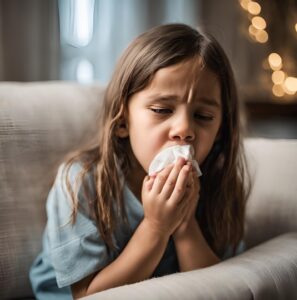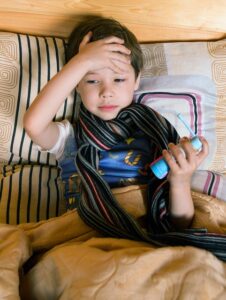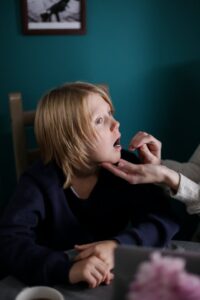Pneumonia in children is a common respiratory illness, particularly in young children whose immune systems are still developing. Pneumonia can be caused by bacteria, viruses, or fungi and can lead to breathing difficulties, and in severe cases, be life-threatening. Therefore, it is crucial for parents to understand how to effectively prevent pneumonia in children. This article shares 10 essential tips recommended by doctors to help parents reduce the risk of their children developing pneumonia.
1. Vaccination: The Most Effective Preventive Measure
Vaccination is one of the most important ways to prevent pneumonia in children. According to the Centers for Disease Control and Prevention (CDC), children should receive timely vaccinations, including the pneumococcal vaccine (PCV13) and the flu vaccine, to protect them from the common bacteria that cause pneumonia. Timely vaccination not only protects children from pneumonia but also reduces the risk of complications caused by pneumonia.
Key Tip: Ensure your child receives the pneumococcal vaccine, flu vaccine, and other routine vaccinations, and keep track of vaccination schedules by regularly consulting with your pediatrician.
2. Strengthen Your Child’s Immune System
Strengthening the immune system is essential for preventing pneumonia. A healthy diet, adequate sleep, and regular physical activity can enhance a child’s ability to fight off diseases. Foods rich in vitamin C and D, such as fruits, vegetables, and fish, can help boost the immune system and improve the body's defense against infections.
Key Tip: Ensure your child maintains a balanced diet, avoids picky eating, and consumes sufficient nutrition, focusing on whole, unprocessed foods.
3. Promote Good Hygiene Habits
Good personal hygiene habits are crucial for reducing the spread of bacteria and viruses. Children should develop the habit of washing their hands frequently and wearing masks correctly, especially during flu season and in crowded places. Teach children to cover their mouth and nose with a tissue when coughing or sneezing and dispose of used tissues promptly.
Key Tip: Encourage your child to wash their hands thoroughly before meals, after using the restroom, and after returning home. Avoid contact with sick children.
4. Avoid Secondhand Smoke and Air Pollution
Secondhand smoke and air pollution are major contributors to respiratory infections. Exposure to smoke and polluted air can damage the airways, increasing the risk of pneumonia. Parents should avoid smoking indoors and minimize their children’s exposure to polluted environments.
Key Tip: Keep the home environment clean, avoid smoking indoors, and prevent children from spending time in areas with high levels of air pollution, especially during poor air quality days.
5. Encourage Your Child to Drink Plenty of Water
Drinking enough water helps keep the respiratory system hydrated and reduces the accumulation of germs in the throat, lowering the risk of infection. This is especially important during dry weather or when the climate is changing.
Key Tip: Ensure your child drinks sufficient water daily and avoid sugary drinks, as they can negatively impact health.
6. Maintain Regular Sleep Patterns
Adequate rest is vital for boosting the immune system. Overexertion and lack of sleep can weaken the immune system, making children more vulnerable to infections. Ensure that your child follows a regular sleep schedule and gets enough sleep each night.
Key Tip: Ensure your child gets at least 8 hours of sleep per night and avoid excessive screen time that could interfere with their sleep quality.
7. Maintain Indoor Humidity
Dry air can lead to a dry throat and airways, increasing the risk of infection. During winter or when the heating system is on, using a humidifier to add moisture to the air can help relieve discomfort in the respiratory system and reduce the risk of pneumonia.
Key Tip: Use a humidifier or place a bowl of water in the room to help maintain indoor humidity and prevent airway dryness.
8. Regularly Clean the Home Environment
A clean home environment helps reduce the spread of bacteria and viruses. Regularly clean your child’s toys, bedding, curtains, and other items, and disinfect the air in your home to reduce the risk of infection.
Key Tip: Clean your child's everyday items regularly, keep the air in your home fresh, and reduce the transmission of germs in the household.
9. Early Detection of Respiratory Symptoms
Early detection of respiratory infections and timely treatment can help prevent pneumonia. If your child experiences persistent coughing, fever, or rapid breathing, consult a doctor immediately. Early treatment can prevent the condition from worsening and reduce the chances of pneumonia.
Key Tip: If your child has persistent symptoms such as coughing, sore throat, or difficulty breathing, seek medical attention promptly and follow the doctor’s advice for treatment.
10. Avoid Crowded Environments
Avoid taking your child to crowded places, especially during flu season or when respiratory infections are prevalent. Crowded places make it easier for viruses to spread, increasing the risk of infection. Maintaining appropriate social distancing can help prevent pneumonia.
Key Tip: During flu season, avoid taking your child to crowded areas like malls or public transportation, reducing the chance of exposure to viruses.
FAQ
Q1: What are the common symptoms of pneumonia in children?
A1: Common symptoms of pneumonia in children include persistent high fever, coughing, rapid breathing, chest pain, lethargy, or loss of appetite. If these symptoms occur, seek medical attention promptly.
Q2: How can I boost my child's immunity to prevent pneumonia?
A2: Boosting immunity can be done by ensuring a balanced diet, regular physical activity, sufficient sleep, timely vaccination, and maintaining good hygiene.
Q3: How important is the pneumonia vaccine for preventing pneumonia?
A3: The pneumonia vaccine effectively prevents pneumonia caused by pneumococcus. Timely vaccination is one of the most effective ways to protect children from pneumonia.
By adopting these 10 doctor-recommended preventive measures, parents can effectively reduce the risk of pneumonia in their children and protect their respiratory health. Understanding and implementing these strategies in daily life helps ensure a healthier, safer future for children.
References
- Mayo Clinic. (2023). Pneumonia Prevention in Children.
- CDC. (2023). Vaccines for Children.
- World Health Organization (WHO). (2023). Preventing Pneumonia in Children.
- American Academy of Pediatrics. (2023). Immunization Recommendations for Children.













